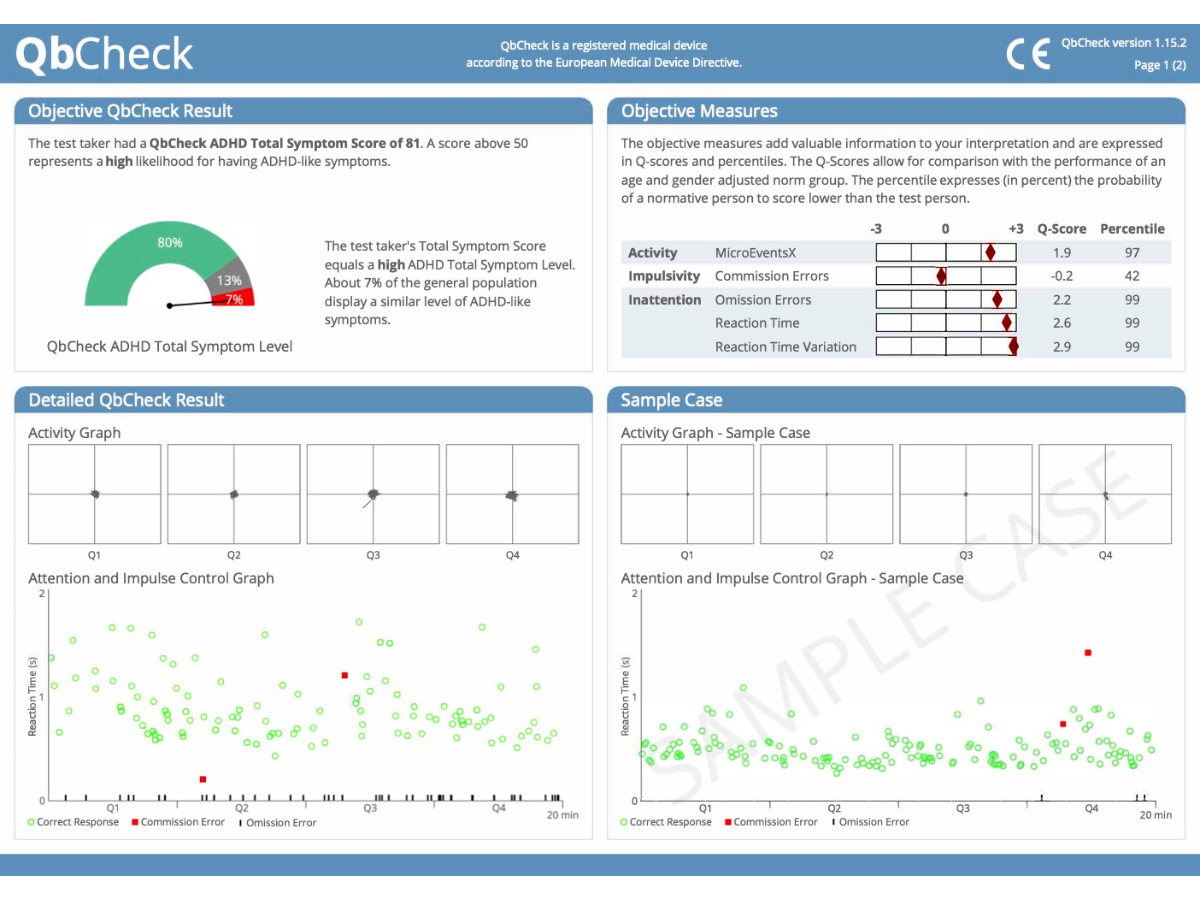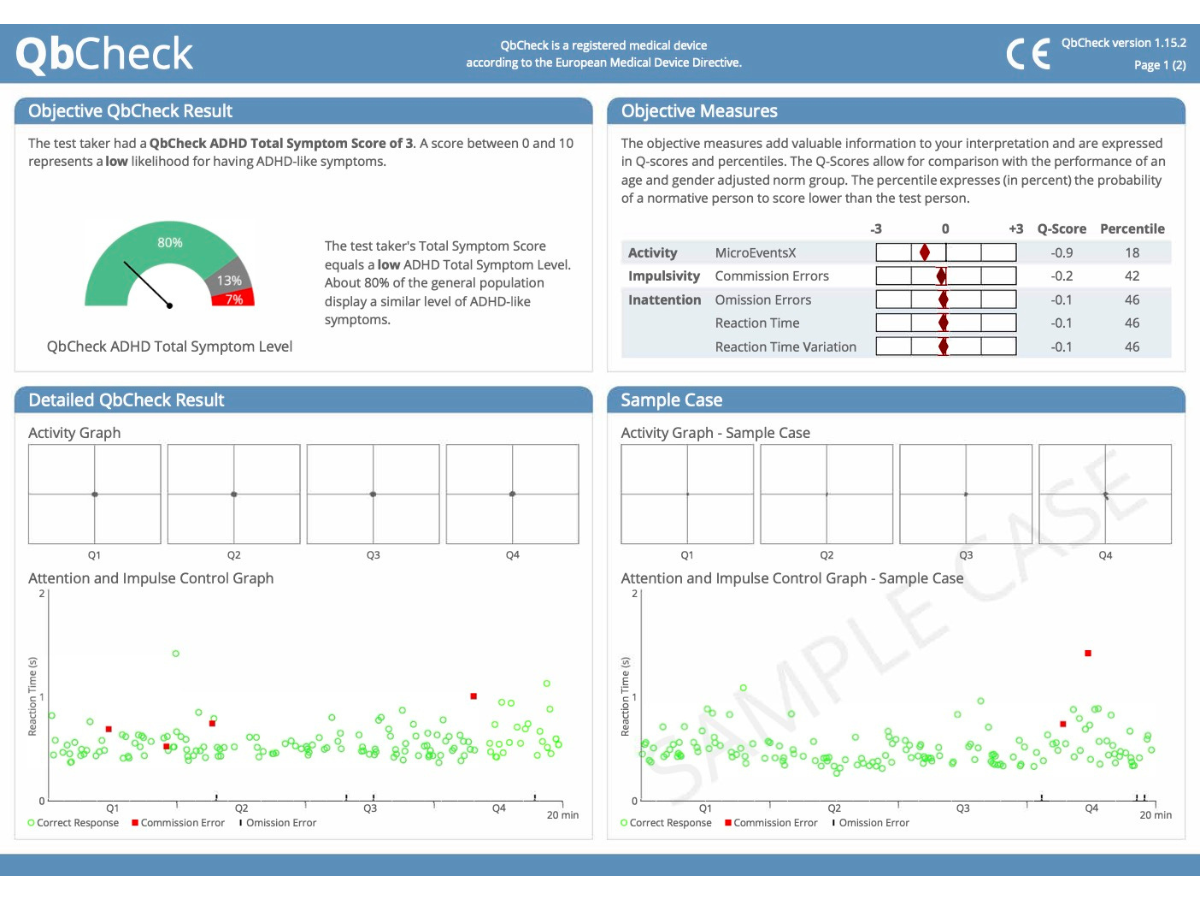ADHD 360 is the UK’s largest virtual healthcare service specializing in ADHD diagnosis and treatment. Its primary goal is to change the lives of those with ADHD through advanced and personalized care.
They incorporated our standardized and robust remote ADHD testing solution QbCheck to optimize time spent on assessments which otherwise can yield ambiguous symptom results. Instead, they could focus on delivering accurate and timely care to patients at scale without compromising accuracy and quality.
Key takeaways
- The ADHD 360 team were able to serve over 1,600 new patients per month in January 2025 by following a streamlined process – 56% more assessments than 1.5 years prior when QbCheck went live
- Full time clinicians each handle 10 assessments a week
- Clinicians are more assertive and understanding of each patient
- Patient opted for this service specifically to avoid delays in assessment and due to ease of remote access
The challenge: Maintaining an accessible, consistent, and high-quality care model
ADHD 360 has been concerned with accessible, consistent, and high-quality care to patients – something that the ADHD care landscape is being scrutinised for across the world over recent years.
Since 2023, QbCheck has played a key part in ensuring a standardized workflow for a large volume of patients across the UK, elevating and validating a robust and efficient process.
Their remote care model streamlines care by gathering a large amount of clinical data on the patient, quantifying their symptoms and gaining clinical confidence through QbCheck, then a diagnostic interview before beginning a treatment plan.
The solution: The role of QbCheck in transforming ADHD care
The team were able to serve over 1,600 new patients in January this year by following a streamlined process – 56% more assessments than in July 2023.

- The service has a very comprehensive onboarding process through an online platform to gather as much clinical data about the patient as possible, so it’s very clear from the outset what they’ve been experiencing.
- Patients remotely complete screening tools including the ASRS and the PHQ-9 to investigate anything underlying, alongside safeguarding history, substance use, mental health history, and a summary care record from their GP. They are also invited to submit physical observations such as height, weight, pulse, blood pressure.
- A QbCheck test is completed at home, so clinicians obtain objective insights into all three core symptoms of ADHD, including hyperactivity.
- Appointments are booked in with clinicians who then prepopulate the patient’s form beforehand and get a holistic overview of their history and symptom presentation.
- Patients join a virtual ADHD assessment where clinicians determine and share the diagnostic outcome along with a visual representation of their symptoms on the QbCheck report to help them understand their clinical presentation.
- Where appropriate, a treatment plan may be put in place which includes follow-up treatment monitoring appointments using QbCheck retests, allowing for direct comparisons before and after any treatment is started.
Thanks to this evidence-based, efficient workflow, clinicians can carry out many assessments, with full-time clinicians handling 10 assessments per week.
"QbCheck has been an absolute godsend. It’s intelligent, informative, and makes the diagnostic process quicker and more efficient,” said Clinical Team Manager Carl Ellis. “It really does give you such a wealth of information to look at, even before you go into that assessment. You can see clearly the patient’s difficulties and you start to understand how this person may present.”
The outcome: A workflow benefitting both clinicians and patients
QbCheck has made it easier to maintain ADHD 360’s stringent diagnostic and treatment monitoring process, resulting in increased satisfaction for clinicians and patients alike.
For Ethan, a university student and patient at ADHD 360, time from initial contact to final diagnosis took him one month, which is significantly quicker than the national average time-to-diagnosis.
One of the main reasons he opted for this service was to avoid delays to assessment which can be more than a year, followed by patient-centered care given by the provider. Due to their care model, he was able to easily get in contact with them about medication and any concerns, which was a huge factor in his decision-making.
Ethan said: “I wanted to get a diagnosis, but if I was on the waiting list, I probably wouldn’t have gotten my diagnosis until after I'd finished my degree. For me, I thought, what’s the point?”
Improved confidence and speed in diagnosis and treatment monitoring
Remote testing with QbCheck gives clinicians confidence because of direct, objective evidence, reduces the strain on clinical staff, shortens assessment times, and enables ADHD 360 to serve more patients in a given timeframe.
"Consistency and quality are at the heart of our virtual care model, and QbCheck plays a key role in upholding these standards. The objective data it provides ensures that every patient is assessed using the same evidence-based criteria, regardless of where they are. Not only does this minimize the risk of subjective bias but also ensures that our clinical team can deliver reliable, high-quality care at scale.”
– Carl Ellis
Carl Ellis noted, “There are no grey areas. We can be more assertive and understanding of each individual. For example, seeing a patient’s QbCheck score drop from 98 to 3 after taking treatment is immensely gratifying. It’s proof of progress.”
He also added, “If we didn’t have QbCheck, somebody scored 4 out of 6 on the ASRS, and there was more complexity to the case, I’d have to discuss with another consultant. We’d have to revisit all the patient data and would still be left with uncertainty. This could take any number of weeks to conclude.”

Enhanced patient engagement
Sharing QbCheck results fosters communication and engagement between clinicians and patients. Our visual reports act as an anchor for diagnoses and allow patients to understand what their test results mean in real life.
Carl explains, “Patients love seeing their results visualized. It’s powerful to say, ‘here’s the data that supports your diagnosis’ and then break it down for them. It creates a strong sense of awareness for my patients and opens such a lovely dialogue. Then as a clinician, I know I’m not just plucking out of the air.”
Ethan added: “The first time I did the test, I kept wondering, ‘When will this be over?’ But on medication, it was easier to focus – I just sat down, and it flew by. Comparing that to the first time, it was fascinating for myself to see how much I'd been able to improve and change over only a few months.”
Receiving his diagnosis didn’t just provide clarity – it allowed Ethan to reflect on his life with a new perspective, helping him see past experiences in a more compassionate light and understanding it’s part of who he is.

Reaching a larger range of patients who face barriers to healthcare
The remote functionality of QbCheck further supports ADHD 360 to reach patients who might otherwise struggle to access ADHD care. For some of these individuals, traveling long distances for assessments isn’t possible, so getting direct access from their own homes is important to remove significant barriers to care.
In other cases, some people don’t have the time to travel to appointments or would generally prefer telehealth care for personal reasons. It’s important to note that in the context of ADHD, patients may not get round to booking in person appointments, so the convenience of an at home consultation can be more helpful.
Ethan commented: “If I’d had to travel far, or visit a GP in person, I would’ve just found another excuse to not go and would’ve pushed it back further and further. Virtual care makes me feel more comfortable talking about things. I’m able to sit in my room in a place I find comfortable and talk.”
Diagnoses given and lives transformed
Once he was given his diagnosis at ADHD 360, Ethan noticed a broader shift in his approach to academics and self-care. Before, he would often feel overwhelmed by tasks and was critical of his inability to meet deadlines. But his diagnosis, coupled with treatment, has given him the power to better manage his workload and stress. “I’m no longer as hard on myself,” he explains. “I’m able to change my routines to adapt more to my condition than I would before because I probably forced myself to work and act in a way that a neurotypical person would.”
For Ethan, the process was life-changing: “I was just trying to make it through the end of university, but now I’m going on to get my master’s.”
